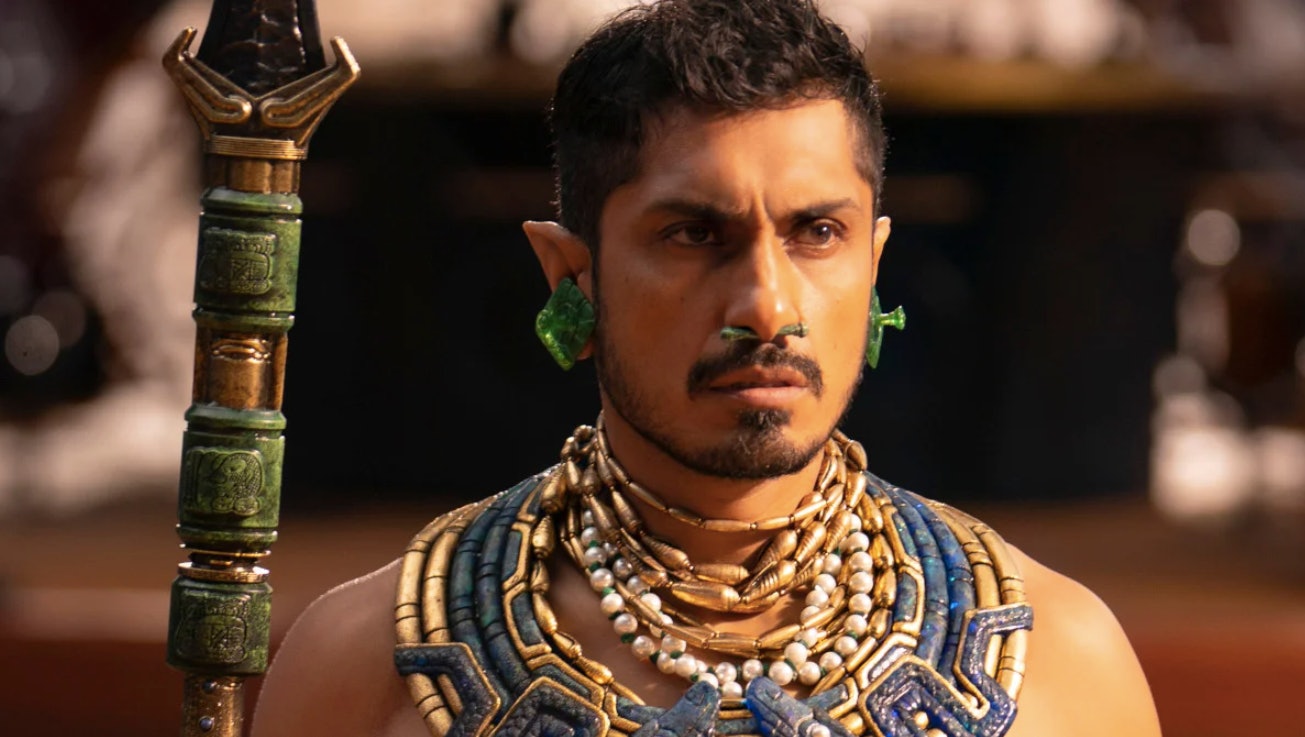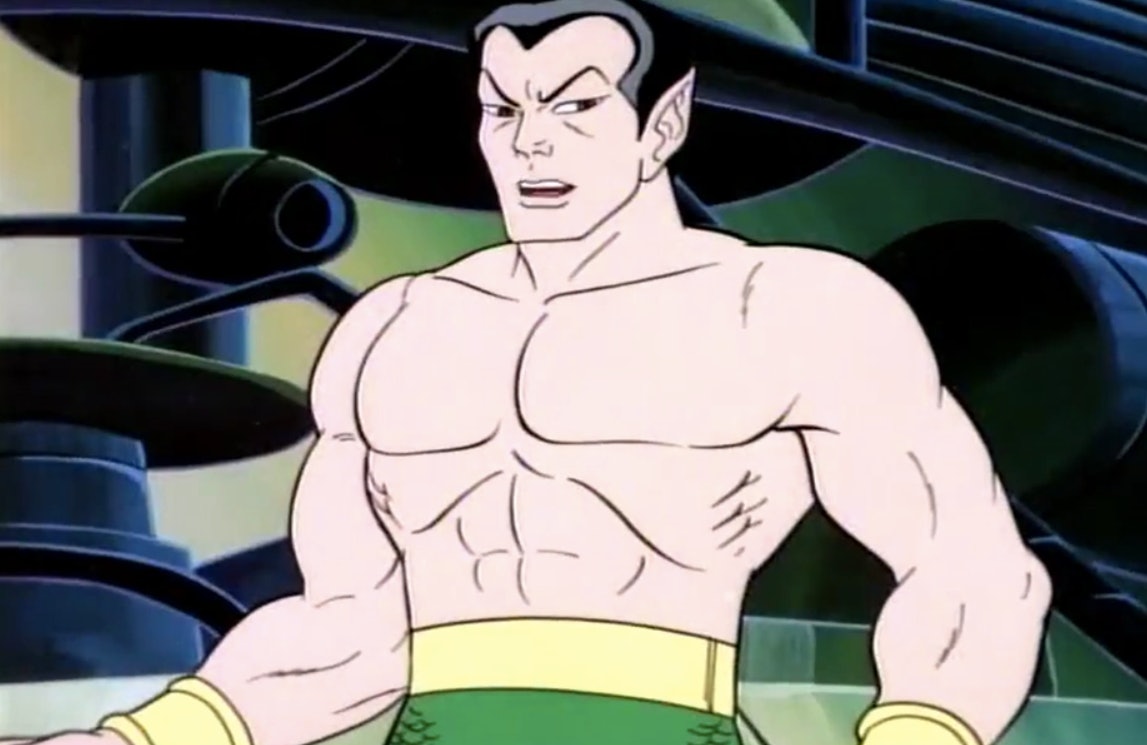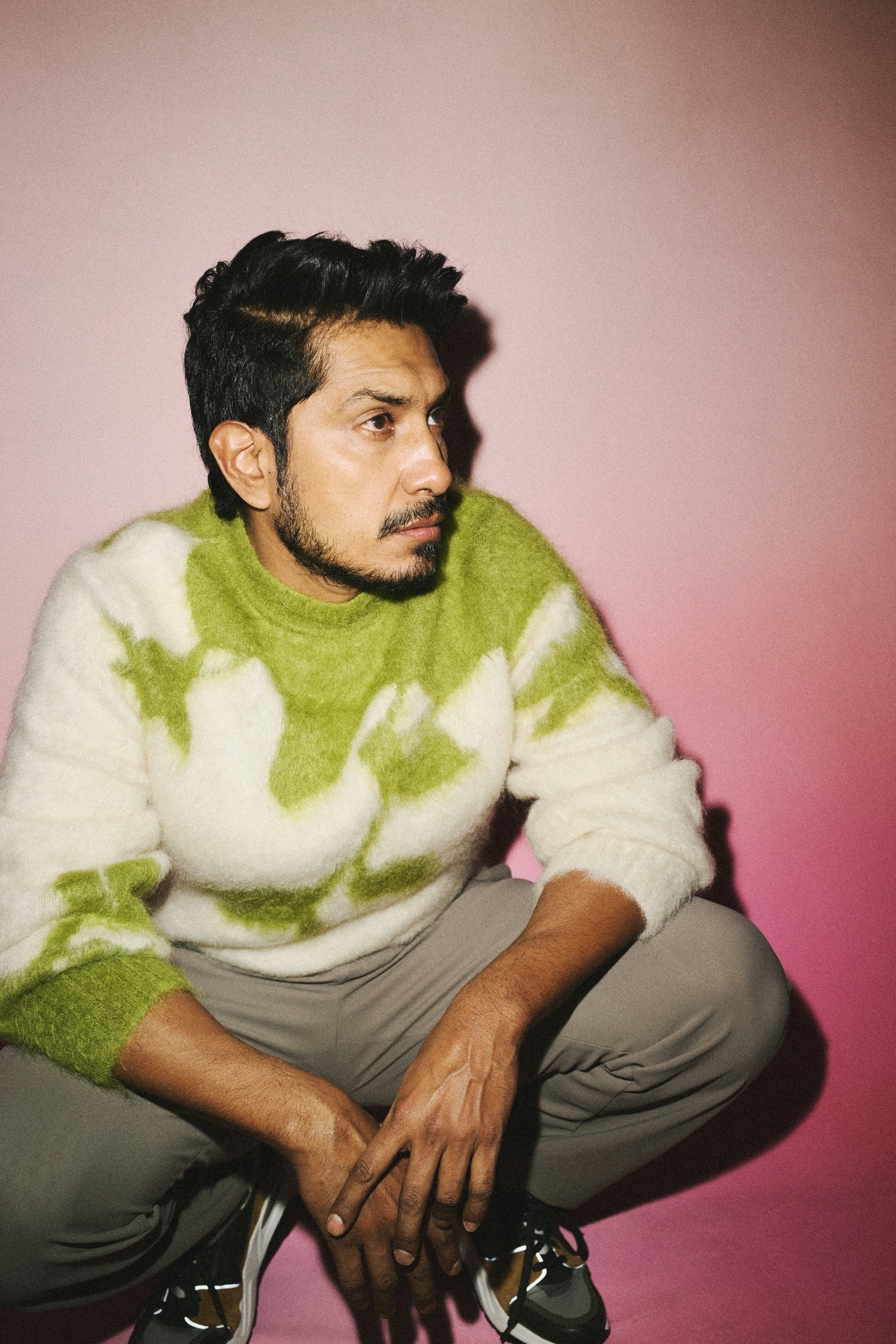
Tenoch Huerta didn’t know how to swim.
During the Covid-19 pandemic, the Mexican actor secretly signed with Marvel Studios to play the role of Namor the Sub-Mariner. In Marvel’s comic book universe, Namor is the arrogant, ferocious ruler of the underwater kingdom Atlantis (think Aquaman with the brain of a Bond villain). He rises to the surface in Black Panther: Wakanda Forever, Ryan Coogler’s sequel to the world-shaking epic of 2018 that made box office history and crisscrossing arms an iconic pose.
But while Huerta was cast on the basis of his talent (to play a smoldering king) and his real-life Mexican heritage (to authenticate a reinterpretation rooted in Indigenous Mesoamerica), he lacked the one ability that Namor should be better at than any Avenger. So, he learned how.
“I took some classes in Mexico. This was during the pandemic, so few pools were open,” Huerta tells Inverse via Zoom. He learned from locals who competed in the Pan American Games. “They were professionals. So first, I learned how to swim and float. In Atlanta, I received the rest of the training, which was freediving.”

Reading Namor’s comic books and Coogler’s script only went so far to help Huerta understand the psychologically complex antagonist. It wasn’t until he submerged himself in water that Huerta found Namor residing within.
“It was so great,” the actor says. “Freediving is active meditation. You’re down below the surface, focusing your body. You have to be aware of your body, and your mind is clear. It’s peaceful. But at the same time, it’s dark. It’s cold. You understand the environments of the character.”
The physical transformation into Namor was unsurprisingly arduous, but the process appealed to Huerta’s “obsessive” personality and seeped into his very pores.
“When I’m in the process [of something], it’s impossible to quit. I don’t know how,” he says. “That’s why my body hurts so much. My body’s saying ‘stop’ and I keep going.”

It’s weeks after the premiere of Wakanda Forever when Huerta opens up to Inverse about all things Namor, from carving out the marble physique of a mutant antihero to empathizing with his complicated humanity. Huerta freely (and refreshingly) admits he hated his gym training, saying as much in a video interview with Men’s Fitness and again to Inverse. But like a king wearing the heaviest crown, Huerta endured every backstroke and deadlift in stride knowing there was more at stake than his career.
A star with crossover appeal, Tenoch Huerta is seizing on his superhero stardom to topple subterranean racial biases against dark-skinned actors in his native Mexico. His ascendency to the throne as Namor, one of Marvel’s oldest and most important comic book characters, is both a rebuke of a myopic, optics-obsessed industry and proof that one’s skin color doesn’t dictate their worth. With audiences everywhere recognizing his name more than ever, Huerta is making sure the world knows what he’s all about.
“With my background and people like me, it’s really difficult to have an opportunity,” Huerta says. “So when you have one shot, you do whatever you have to do to take advantage.”

Before Black Panther, Tenoch Huerta’s earliest memory of Namor is like a childhood vision.
“I’ve never been a big fan of superheroes in terms of comic books,” Huerta says. “I used to watch the old cartoons.”
Huerta can now, just barely, make out a memory of seeing Namor on his family’s television with his three older siblings. Maybe it was on Fantastic Four. Maybe it was Spider-Man and His Amazing Friends. Wherever the show was, it was long ago when Namor appeared before a 5-year-old Huerta like a hazy harbinger. “These memories are like a blur,” he says, “but he was there.”
In his youth, Huerta’s father signed him up for acting classes, and by 2006 he fully embarked on a career. His first role was as a window cleaner in the indie drama Así del Precipicio. Three years later he played “Lil Mago” in the 2009 international hit Sin nombre. In 2012 he starred in the one-season boxing drama Cloroformo, and in 2017 starred in 65 episodes of Blue Demon, a biopic of the legendary Mexican luchador.
Huerta found his way into English-language productions starting with the 2013 drama Stand Clear of the Closing Doors. After a bit part in the 2015 James Bond film Spectre and episodes of Amazon’s Mozart in the Jungle, he joined the cast of Narcos: Mexico, a spinoff of the hit Netflix crime drama. In 2021 he boarded Blumhouse’s Purge franchise in The Forever Purge.


After months of rumors in fandom spaces like Reddit, Huerta waltzed onto the stage of the 2022 San Diego Comic-Con with Marvel Studios to announce his entry into the Marvel Universe as Namor in Black Panther: Wakanda Forever. Even now, reality feels like an impossible dream.
“Ryan [Coogler] told me this new background for the character,” Huerta details about his initial conversations with Marvel Studios. “It blows my mind. He has the sense to recreate the background of the character, adding this fantastic Mesoamerican world.” Huerta was so enthused, he connected Coogler and the studio to Mayan scholars he personally knew to consult on the film’s Mesoamerican-inspired Talokan, Namor’s kingdom that supplants the comics’ use of the more familiar Atlantis fantasy.
“That’s why this approach feels so authentic,” adds Huerta. “You know, that theory that the Mayans were aliens, just because they weren’t white, it’s nonsense. It’s insulting. For me, it’s offensive saying that. Now, Ryan’s created this world, this fantastic exercise, ‘What if they created this world, but created from accurate information?’”
“This guy is trying to do something bigger than himself.”
On the future of Namor in the MCU, Huerta deflects any knowledge about future appearances. “I think Kevin Feige can answer that question,” he says, laughing. But while he expresses a desire to work with other Marvel stars in tomorrow’s Avengers crossovers, his ever-calculating, power-seeking Namor might have other things in mind.
Though Huerta doesn’t fully see himself in his role as a Marvel villain, there’s a striking similarity between them. On the precipice of worldwide recognition, they both have their chiseled chests upright, prepared to dive deep. One need only take a closer look at Namor’s big, chilling speech in Wakanda Forever to understand Huerta himself.
“This is not the typical antihero who is just crazy and wants to kill people. He doesn’t want to rule the world. He’s trying to protect his heritage,” Huerta says. “This guy is trying to do something bigger than himself.”

A month before Black Panther opened in theaters, a racism scandal at an upscale Mexico City steakhouse brought to the surface what has only bubbled in Mexican society for so long. Detailed by The Los Angeles Times, employees of Sonora Grill Prime revealed their establishment had a “policy of segregation” to keep its best tables for patrons with lighter skin.
Of course, the restaurant denied this. But the revelation rocked the atmosphere of a multicultural nation whose identity is profoundly shaped by European post-colonialism and a social hierarchy based on skin color and race. At a press conference, Mexico City Mayor Claudia Sheinbaum said racism in Mexico is “real,” and that Mexico must “accept that it exists and fight it.”
The scandal is a microcosm of Mexico’s history of racism against its population of dark-skinned Indigenous citizens, and white-passing, mixed-race mestizo descendants. Whitexican is a new term that in shorthand refers to Mexico’s widespread colorism that favors whiteness.
“If you turn on the TV in Mexico, most of them are white, blond.”
Standards for European-influenced white beauty and masculinity are prevalent throughout Mexican media, which cements stereotypes across color lines. White-passing actors in Mexico typically occupy the aspirational lifestyles sold in beer and car commercials and the artistically enriching roles of TV and movies. Meanwhile, dark-skinned actors play characters on the lower rungs of the socioeconomic ladder, playing unflattering archetypes like gang members, criminals, or desperate people in need of charity.
“If you turn on the TV in Mexico, most of them are white, blond,” Huerta says. “Someone like me, you don’t have too many opportunities. You can be a rapist, or you can rob a bank.” He speaks from experience. His character in Sin nombre is killed after he attempts to rape the female lead. “The representation is really, really ugly against brown-skinned people. There’s this argument that people just want to see white guys.”

Carl W. Jones, a veteran advertising director in Mexico, wrote in 2019 for The Conversation outlining the broad strokes of colorism in Mexican media: “The perception within the Mexican advertising industry is that if a white person uses a specific brand, the product is considered to be desirable … the consumer thinks they are participating in a desirable ‘white’ lifestyle.”
In contrast, darker-skinned people “are rarely used by advertisers to represent an aspirational or desirable lifestyle.”
Huerta has unmistakably dark brown skin. His great-grandmother was Purépecha from Michoacán, while another of his grandmothers was Nahua. Both are indigenous Mexican ethnic groups who’ve blessed their bloodlines with the features they’ve passed on, like their skin tones. It’s this complexion Huerta’s inherited that occupies prominent screen time in a Marvel blockbuster, a presence that stands in defiance to biases against people like him.
“I know the entire world is looking at me. And I’m going to speak about it.”
While Hollywood has its own racist infrastructures to contend with, Huerta is hoping his native Mexico takes a good, hard look at him, in all his dark olive glory, in Wakanda Forever. For Huerta, representation for people like him is more than a dream. It’s his duty. “This is a big platform. Now I have the privilege to be seen and to be listened to by the world. I know the entire world is looking at me. And I’m going to speak about it.”
Even Namor, coded in Marvel’s comics as a foreign outsider who preaches war against the white man’s world, is illustrated with peachy pale skin. His assumption of the role only makes historical subtext part of the canon. “Just the character [of Namor] being brown-skinned, having these Mesoamerican characters. The representation is strong enough to send a strong message to the world,” Huerta says.

Huerta is aware of his own limits as an advocate. He wants Indigenous actors to prosper in the industry but stops short of identifying as fully Indigenous himself. “We have Indigenous roots, but that doesn’t mean we are Indigenous,” he says. “We lost our language, our way of life. You can name yourself Indigenous, but I’m not Indigenous.”
But language is a powerful connection, as close as one can be to their ancestors. In addition to swimming lessons, Huerta took a crash course in Yucatec Mayan, one of many Mayan languages that Namor and other Talokans speak in Wakanda Forever. “It was a challenge to sound realistic,” he explains. “It was something we really took care [of]. The pronunciation, the rhythm, musicality of the language, in the way that the Maya people can identify themselves.”
One scene in the film, where Namor boldly declares his intentions to invade Wakanda with stirring ferocity, was a particular area of focus for Huerta to perfect his Mayan. “The scene was longer,” he reveals. “I said more things, the speech was more complex. But they have to cut it. But it’s a matter of defense. They [Wakandans] violated our defenses. It’s a diplomatic way of saying, ‘You should respect me. We can work together, or not.’”
Shortly after the release of Wakanda Forever, messages from fans enlightened Huerta on the resonant power of his representation. “We received a lot of messages from people, in Yucatan especially, saying, ‘My grandmother could understand’ or ‘My kid wants to learn Maya now because they watched this movie.’ Yeah, representations matter.”
At the beginning of his work on Wakanda Forever, Tenoch Huerta didn’t know how to swim. Now, he’s ready to dive in.
Top Image Credits: Dsquared2 cardigan, Todd Snyder tank top, Theory pants
Photographer: Ben Rayner
Stylist: EJ Briones
Talent Bookings: Special Projects
Inverse celebrates the best of the best in entertainment, gaming, science, and technology of 2022. Go to the Inverse Awards hub.







